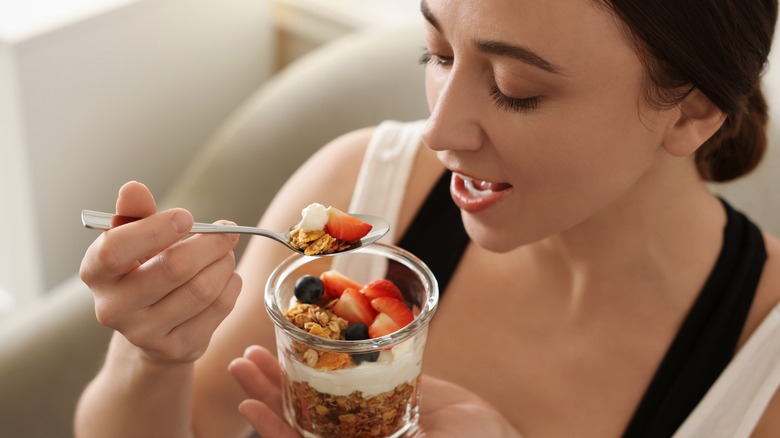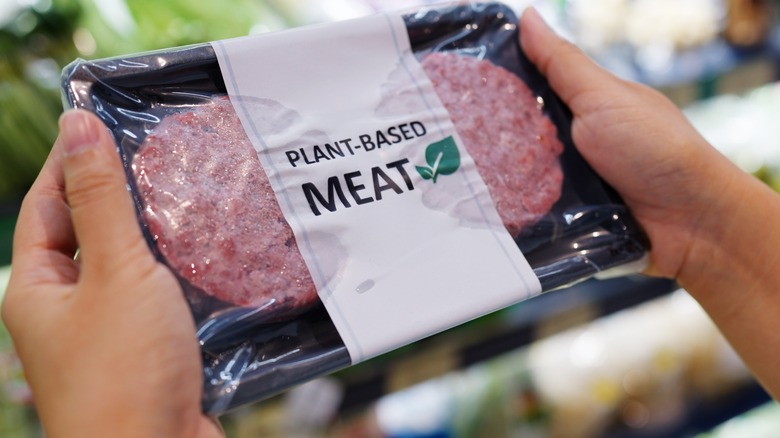Deceivingly 'Healthy' Foods That Are Secretly High In Sugar
Sugar has a way of sneaking into foods. Even if you think you're eating a healthy diet that's low in refined sugars, you may end up increasing your sugar consumption significantly without realizing it. What are the top "sneaky sugar" items to be on the lookout for? Smoothies, some yogurts, cereals, granola bars, and plant-based meats head the list, according to Vanessa Rissetto, registered dietitian and CEO of Culina Health.
This isn't to say that you need to stop eating sugar, of course. As Rissetto explains, the American Heart Association guidelines say that most women can safely consume approximately 6 teaspoons (25 grams) of sugar daily. For men, the amount is slightly higher at just about 9 teaspoons (36 grams) of sugar. However, you have to be cautious.
Too many foods that are marketed as being healthy are laden with added sugars and sweeteners. (Blame the human penchant for liking sweets.) Unlike naturally occurring sugars such as fructose and lactose (which Rissetto says provide nutrients), sugars that are added to foods and beverages during processing generally offer only empty calories.
Popular snacks can be high on sugar
Let's begin by talking about smoothies. Even if you make your own rather than buy one at your favorite juice bar, coffee shop, or cafe, you might be tossing in some sugar without knowing it.
"People add things like ice cream and different protein powders that can increase the sugar content," Rissetto notes. Just how high can the sugars go in a smoothie? She says more than 60 grams isn't off the table, meaning a single smoothie could end up delivering more than two times the suggested daily sugar limit for women. An article from Healthline on the 21-day "smoothie diet" concurs, warning that smoothies can cause sugar spikes.
Obviously, the easy workaround is to know the sugar content of the ingredients you're adding to your smoothies, which brings in the subject of yogurt. A staple base for many smoothies, yogurt isn't necessarily bad. According to data from the U.S. Department of Agriculture, a four-ounce serving of plain, unsweetened yogurt made from whole milk has just 5.27 grams of sugar. But if sweeteners have been added for flavor, the sugar load could rise. Says Rissetto, "Flavored yogurts are usually made with sugary jams, which increase the calorie and sugar counts."
Breakfast fare with sugars to spare
Cereals are another food group where it's common to find added sugar. Rissetto advises looking beyond seemingly "healthy" cereals to explore the ingredients and nutrition labels. There, you may find out that a cereal that's marketed as "good for you" may contain more sugar in a serving than you expected.
You shouldn't feel bad if you've been misled. A 2020 study published in Social Science & Medicine looked at the shelf placement of breakfast cereals. Even after redesigning shelves to put healthier cereals in more prominent places, consumers often reached for cereals based on brand or price regardless of nutritional content or health benefits. In other words, you may have fallen prey to questionable marketing tactics if you find out you've been unknowingly eating sugary cereal.
Like cereal, granola bars may be described as a healthy snack or post-workout recovery mini-meal. However, Rissetto notes that although a serving size is around 1/8th of a cup, people tend to overindulge — and wind up eating more sugar than they bargained for. So, how much sugar can granola carry? Quite a bit. A 2022 article available in Better Nutrition notes that some granola bars contain as many as 25 grams of sugar.
Vegetarian foods that are sugar hideouts
Your favorite plant-based meat products might be the last place you'd expect sugar to be hiding. But plant-based meat products can contain non-nutritious ingredients. Blame on the way they're created: Plant-based meat substitutes are often ultra-processed. This gives them more of the physical look and flavor of meat, but it also means they're packed with more than just all-natural vegetables.
Consequently, you'll want to read up to find out if a plant-based meat you're thinking about eating is crammed with extra fat, salt, and sugar to improve its taste or appearance. Even if your plant-based meat is low in sugar, know that it could be nutritionally lacking in other ways.
For example, an article from Medical News Today indicates that plant-based meats are generally higher in sodium than authentic meat. And as noted by the U.S. Centers for Disease Control and Prevention, overindulging in salt can put you at an increased risk of developing cardiovascular problems. Consequently, if you're trying to keep your sugar and salt consumption to a minimum, you may need to find a plant-based food that's processed without a lot of sweeteners and salt thrown into the recipe.



